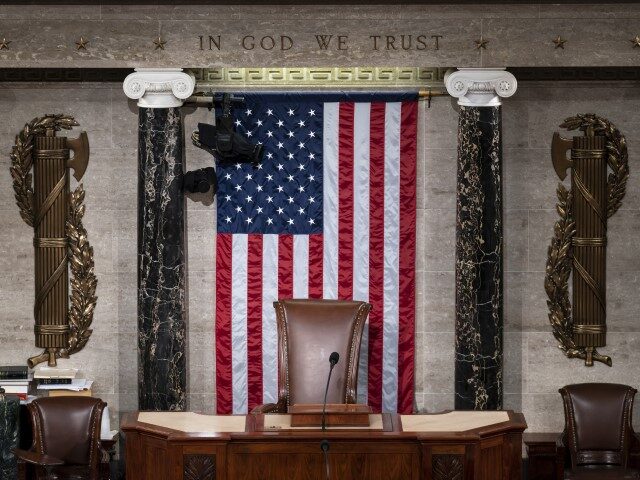Reps. Steve Scalise (R-LA) and Jim Jordan (R-OH) square off today in the Speaker’s race, but first Republicans must decide on potential election rules changes.
The winner of the Republican nomination will go to the House floor as soon as Thursday.
House Republicans met Tuesday night for a candidate forum a day after convening for the first time in a week. Jordan and Scalise addressed their colleagues and answered questions for over two hours.
Both candidates lack enough public endorsements to achieve the necessary majority, although Jordan possesses more than Scalise. Yet each claim they have locked up enough support to win.
Under current conference rules, the candidate winning a simple majority will be the nominee. This process was used to nominate Rep. Kevin McCarthy (R-CA). The ugly January floor fight that occurred soon afterwards looms large. And Republicans want to avoid it.

Matt Gaetz (R-FL) talks to House Republican Leader Kevin McCarthy (R-CA) and his Deputy Chief of Staff John Leganski, in the House Chamber during the fourth day of elections for Speaker of the House at the U.S. Capitol Building on January 6, 2023, in Washington, DC. (Chip Somodevilla/Getty)
Rep. Chip Roy (R-TX) has garnered attention with a proposed rules change designed to ensure the Republican nominee will win on the floor. His rule would require 217 votes in conference to win the nomination and includes a series of rounds and evolving vote questions and thresholds to assure the Speaker fight occurs behind closed doors.
With only 221 Republicans, 217 is the number needed on the House floor to secure the gavel.
Roy and his allies, including moderate Rep. Brian Fitzpatrick (R-PA), believe they have enough support to enact the rule change, but first the conference must debate and vote on it.
The rules change would only apply through the end of this year, essentially applying only to this election — unless another Speakership is sunk in the next couple of months.
The Roy rule would require a candidate receiving a majority of the vote but under 217 to be subject to additional questioning by the conference before a second secret ballot vote, this time simply whether each Member will commit to supporting the candidate on the House floor.
If that vote fails to receive 217 in the affirmative, another round of questioning commences before an additional secret ballot vote on the same question.
On that vote, if a candidate does not get at least 185 committments, the process starts over, with the floor open to new nominees. But if more than 185 but fewer than 217 members cast their vote in the affirmative, an additional round of questioning from the conference is triggered.
However, after this round, the vote is a manual roll call vote, not secret ballot.
If the candidate fails to reach 217 after the roll call in which each Republican makes public (to his colleagues) where he stands (once again, fewer than 185 would trigger the process to start over), yet another round of questioning the candidate takes place, followed by a final roll call vote.
In this final vote, the candidate must get 217 Republicans to commit to back him on the floor. Failing that, the entire process begins anew, with additional nominees permitted to make their case.
At any point, if 217 Republicans commit to a candidate, that candidate becomes the nominee. And another January embarrassment is all but assuredly avoided.
Jordan, whom Roy supports, indicates he supports some kind of 217-vote conference threshold of the nominee.
But nothing is certain, and additional rules changes, including a proposal by Rep. Tom McClintock (R-CA) to automatically expel any House Republican who votes against the majority of the conference’s choice, may be brought up Wednesday.
Current conference rules remain until changed, and it remains possible that proposed rule changes fail and a candidate is chosen on the first ballot by a simple majority.
However, with Republicans haunted by January, it is likely some change will be made to prevent an ugly floor fight. That could trigger a potentially weeklong process.
While not ideal, a weeklong behind the scenes battle is preferable to a public spectacle.
In an election with significant consequences for the future of the Republican Party, it is notable that process has overtaken policy in the final moments.
Follow Bradley Jaye on Twitter at @BradleyAJaye.

COMMENTS
Please let us know if you're having issues with commenting.